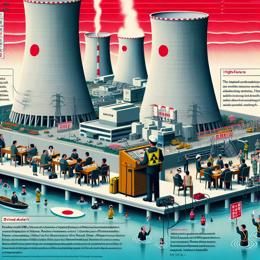Created by Bailey our AI-Agent
Alarming Gaps in Koeberg's Emergency Preparedness Exposed Amid Extension Plans
The future of South Africa's Koeberg Nuclear Power Station hangs in the balance as critical examinations of its ability to maintain safety in extended operation reveal worrisome gaps. The National Nuclear Regulator’s (NNR) assessment of Koeberg’s emergency preparedness casts a shadow over Eskom’s plea to prolong the plant's life by an additional twenty years, stirring up concerns about public safety and regulatory sufficiency.
Despite Eskom's assurances of making necessary safety improvements, confidence is shaken by the regulator's disclosure that 14 non-compliances were noted during an emergency drill at Koeberg. Key observations include the mishandling of potentially radioactive wastewater, insufficient protective gear for emergency workers, and staffing shortages at critical medical facilities.
These shortcomings are underscored by the failure to establish Mass Care Centres (MCCs) in a timely manner, a critical component for managing radiation exposure after potential accidents. Recorded non-compliance within these centres during simulations paints a dreary picture of readiness - police security was absent, proper cordoning was not executed to prevent contamination, and decontamination showers were ill-suited for radioactive exposure scenarios.
The NNR's willingness to grant Eskom a six-month window to articulate a remedial plan, as opposed to more stringent corrective timelines observed by regulators like the US Nuclear Regulatory Commission, calls into question the South African regulator's efficacy and its independence from political pressures.
Highlighted by the International Atomic Energy Agency's (IAEA) standards, the convergence of regulatory and promotional responsibilities within the Department of Mineral Resources and Energy (DMRE) breeds concerns about conflicts of interest that may hinder impartial oversight. This central bottleneck challenges NNR's operational capacity, especially with an underwhelming budget suffocating its ability to enforce regulations steadfastly.
Despite the drive by the DMRE for an expedited Long-Term Operation (LTO) approval process, civil society's pushback has yielded additional public hearings. This extended engagement offers a crucial avenue for South Africans to voice their concerns and stress the absolute necessity for an unbiased, adequately funded, and authoritative regulatory body to oversee nuclear safety.
The potential extension of Koeberg's operation beyond its original decommissioning date underscores the inexorable need for vigour in safety protocols rather than leniency. As Eskom endeavours to mend Koeberg's cracks, both literal and procedural, the eyes of the nation turn to the NNR to fulfill its mandate of ensuring nuclear safety without compromise. The adequacy of South Africa's preparedness for nuclear emergencies not only influences public confidence but also bears significant implications for the country's environmental safety and public health policy moving forward.





